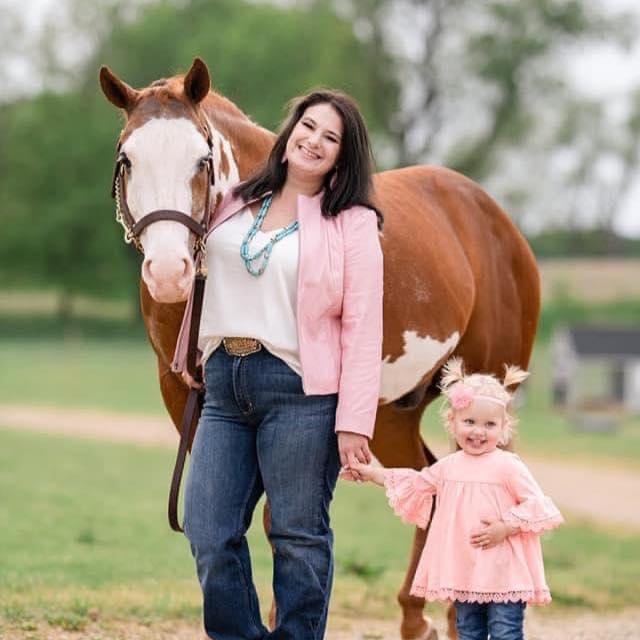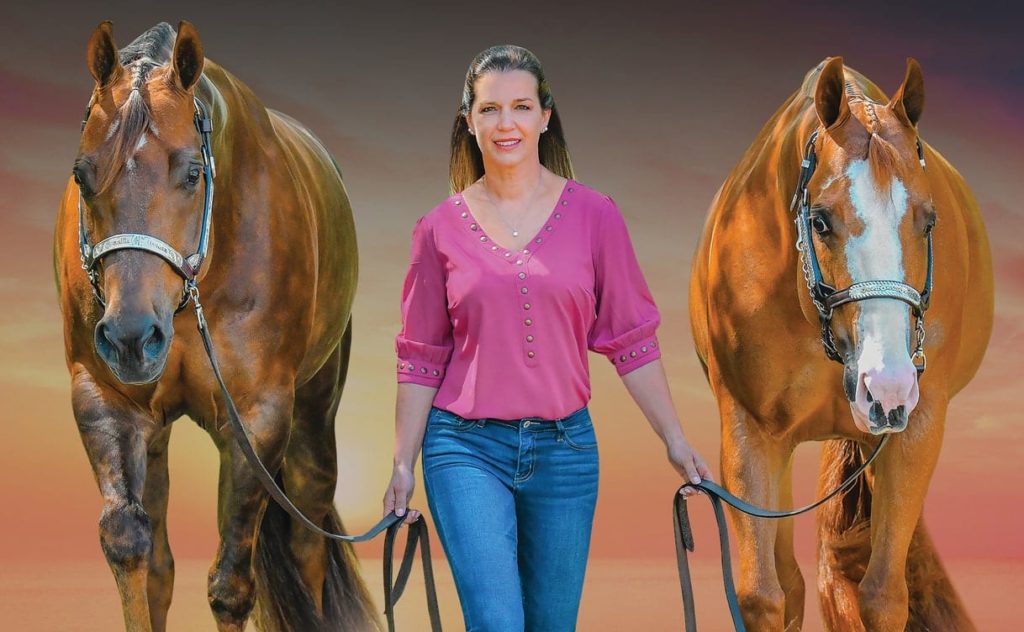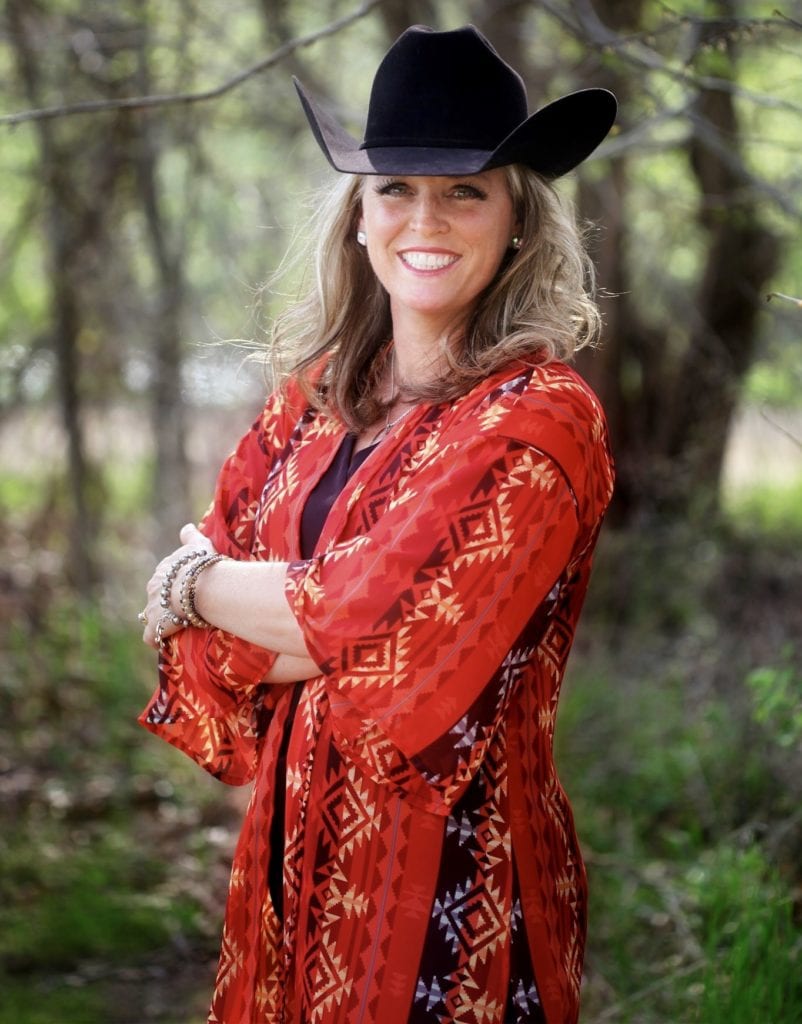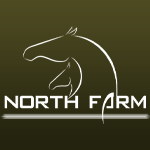It’s the night before you are leaving for a horse show weekend. You are excited, but your stomach is a fluttery mess. You can’t stop moving: you (triple) check the bags you’ve packed, you look through every cabinet in the house to make sure you haven’t overlooked anything, and you throw in one last load of laundry (while thinking in your head that you won’t have time to fold it or put it away).
The whole time you’re prepping, a news-report style ticker of to-do items, questions, and tasks runs through your mind. Did I miss anything at the grocery store? I should start putting together a list for the grocery order I’ll have to put in when we get to the show. I still have to put together that pitch deck for the meeting next Wednesday. Shoot – I forgot dog food…I’ll get dog food on the way. I hope they set the horsemanship pattern up big…I will need room to get a large, fast circle going and transition at the center. I wish I had been able to get in one more ride…
If you’re someone whose many roles in life constantly pull you in a thousand directions, chances are you have a running ticker in your mind as well. Often, this ticker includes shades of guilt over many different things. Did you spend enough time with the kids? Are you neglecting anything at work? Should you be investing so much time and money in your horse hobby?
Yet, despite the guilt that may creep in and the many demands on your time, pursuing your passion for horses is important; horse show guilt is a thing, and it shouldn’t be. GoHorseShow spoke with four unique exhibitors in the industry who offered their thoughts on experiencing and dealing with horse show guilt. Learn from their experiences and strategies for tamping down the guilt and enjoying your horse time.
Q: Many people who ride horses and show, balance a lot; career, family, other hobbies, travel, etc. Briefly describe your lifestyle and how you approach making time for horses.
 Jennifer D’Onofrio, Amateur Competitor: I am the mother of two very cool and active kids. My daughter, Bella shows horses at a national level, and she also plays both club and high school soccer. She also races on an alpine ski racing team based in Pennsylvania. My son Griffin is an avid and passionate snowboarder who competes with the Pennsylvania Freestyle team. He also plays club and high school soccer. I have my Master’s degree in physical therapy and enjoy riding, running, playing tennis, and skiing. I have not practiced physical therapy for over 5 years now, due to the time demands and travel that the horses, soccer, and snowboarding require. They are unique sports that way, and it wouldn’t be possible without my husband’s support. I maintain my license and will return to my profession when the kids leave for college.
Jennifer D’Onofrio, Amateur Competitor: I am the mother of two very cool and active kids. My daughter, Bella shows horses at a national level, and she also plays both club and high school soccer. She also races on an alpine ski racing team based in Pennsylvania. My son Griffin is an avid and passionate snowboarder who competes with the Pennsylvania Freestyle team. He also plays club and high school soccer. I have my Master’s degree in physical therapy and enjoy riding, running, playing tennis, and skiing. I have not practiced physical therapy for over 5 years now, due to the time demands and travel that the horses, soccer, and snowboarding require. They are unique sports that way, and it wouldn’t be possible without my husband’s support. I maintain my license and will return to my profession when the kids leave for college.
 Kelsey Keathly, Equine Marketing Specialist & Photographer: I currently don’t show, but I spend most of my life at horse shows or with horse people. It’s what my life revolves around as a full-time equine photographer and marketing specialist. I am always doing something that is 100% in the horse industry. I’m on the road about three weeks in a month, and so far this year, I’ve done 12 shows (as of June) in addition to portrait trips that take me across the country. It’s a lot of travel, and it’s hard to balance that with being a single mom. I just decided to cut back on shows and travel to spend more time at home. I’ll be leaning into the diversity of my portfolio. I’ll be doing more ad design, editing, and business coaching. I also own two horses, and I hope to get back in the show pen in the future.
Kelsey Keathly, Equine Marketing Specialist & Photographer: I currently don’t show, but I spend most of my life at horse shows or with horse people. It’s what my life revolves around as a full-time equine photographer and marketing specialist. I am always doing something that is 100% in the horse industry. I’m on the road about three weeks in a month, and so far this year, I’ve done 12 shows (as of June) in addition to portrait trips that take me across the country. It’s a lot of travel, and it’s hard to balance that with being a single mom. I just decided to cut back on shows and travel to spend more time at home. I’ll be leaning into the diversity of my portfolio. I’ll be doing more ad design, editing, and business coaching. I also own two horses, and I hope to get back in the show pen in the future.
 Vanessa Froman, Amateur Competitor: I am a mother, wife, daughter, daughter and sister in law, investor, friend, taxi driver, social planner, personal assistant to my entire family and horse family, soccer mom, a black belt in Taekwondo, and I try to be a horse show mom in the moments I have left. We love to travel a lot as a family, in addition to going to horse shows. Most of our life is planned around our big horse shows. That being said, we also live by the philosophy that there will always be another horse show. To make it work, my husband John and I have an old-school, paper desk-planner that we have regular meetings over to plan out who will be where and get all the important logistics down.
Vanessa Froman, Amateur Competitor: I am a mother, wife, daughter, daughter and sister in law, investor, friend, taxi driver, social planner, personal assistant to my entire family and horse family, soccer mom, a black belt in Taekwondo, and I try to be a horse show mom in the moments I have left. We love to travel a lot as a family, in addition to going to horse shows. Most of our life is planned around our big horse shows. That being said, we also live by the philosophy that there will always be another horse show. To make it work, my husband John and I have an old-school, paper desk-planner that we have regular meetings over to plan out who will be where and get all the important logistics down.
 Dr. Regina Schinker, Ph.D. Amateur Competitor and Co-Host of the Horse Industry Podcast: Communicate, communicate, communicate. I am fortunate to have a very supportive husband. Between our careers, our kids’ sporting events, and community volunteerism, we are both juggling a lot of responsibilities. My husband and I share our schedules. I always have time to go to the barn blocked out on my calendar.
Dr. Regina Schinker, Ph.D. Amateur Competitor and Co-Host of the Horse Industry Podcast: Communicate, communicate, communicate. I am fortunate to have a very supportive husband. Between our careers, our kids’ sporting events, and community volunteerism, we are both juggling a lot of responsibilities. My husband and I share our schedules. I always have time to go to the barn blocked out on my calendar.
Q: Why is it important to you to make time for horses despite (or perhaps because of) your busy life?
Jennifer D’Onofrio: Horses are my passion. I love these animals for their huge hearts, their athletic abilities, their response to training, and how they love us back. I feel horses teach us so much about life. They need our care, even when we are exhausted, or it wasn’t a great ride. I’m fortunate Bella shared this love with me. The memories we have from traveling around the country together are priceless to me.
Kelsey Keathly: I went to college for Equine Business Management because I knew I wanted to do something in the horse industry and something (ideally) that kept me at horse shows as much as possible. Through my experiences doing media photos at the Congress for GoHorseShow, I gained experience and interest in photography and marketing.
Vanessa Froman: I have a teenager who hounds me regularly about when we can see the horses again. So even if I didn’t love horses, it is important to my child; thus, it has to be important. We have had days in our lives that make it mandatory we get to our horses to help us heal and feel better. So no matter how busy we get, we make our happiness a priority…horses make us happy.
Dr. Regina Schinker: For many of us, showing horses is a life-long passion. I can’t imagine not finding the time to ride, show, and engage with my equine community. It’s part of who I am. My kids have benefited tremendously from their 4-H and equine experiences. I’m currently at the Paint World Show with my 14-year-old daughter. The AjPHA youth activities she’s been able to participate in and the experiences she’s having are priceless.
Q: What kinds of horse/life/work balance guilt do you typically experience or think about?
Jennifer D’Onofrio: My biggest guilt is that it takes me away from my son and husband quite a bit. My son likes horses, but has never had any desire to ride. His athletic schedule keeps him just as busy, so we often have to divide and conquer, so to speak. This can leave us weeks on end not seeing each other. I also know that the cost of showing and the time required keeps us from doing things my husband has sacrificed, such as travel.
One way I balance our busy show season is that I travel a lot with my son in the winter during snowboarding, and my husband takes Bella to her ski races. This allows me time to travel with him and switch kids. In addition, it gives both of us the chance to spend quality time with each kid. Of course, this doesn’t get us time with each other, but every fall after Congress and soccer season, we take a couples trip to the Caribbean and reconnect, even if that means my horses go to the AQHA World Show without me.
The other guilt we deal with is letting a team and coach or our trainer down. There have been games we missed while at a show. Bella was the leading scorer on her club team this season, and we missed her playoff game because we were at a show. Other times, we might miss classes at shows that could have led to high points or national standings. Our trainer knows we can never go to the Big A because it is a soccer team camp, and we already miss tryouts for the World Show.
Kelsey Keathly: I worry, ‘what if Kailee doesn’t like horses’? What if I’m doing this separately from her, and this causes a divide when she’s older? So far, this is not the case. Also, while I’m at shows and she is young, I feel guilty because I’ve been watching her grow up on FaceTime. She’s two, and many things are happening in her life right now, and while I’m trying to bring her with me as much as possible, it isn’t always best for her to be on the road with me.
Vanessa Froman: I can not tell you how many meltdowns I have had over missing my youngest son, Connor’s soccer games or just not being there for him in person for weeks on end. Right now, we are on our way to the APHA World Show, where we rented a VRBO with a pool, and we are trying to make it into a modified family vacation. That helps my guilt, and Jayna [Pogue] gets to show leadline with ‘her’ horse Becky and her mommy [trainer Jenell Pogue] in the big show arena. Jayna loves horses, and I hope continues to want to show with the other youth kids. The APHA World Show is one of the best for families. Even my husband, John and other son Connor enjoy coming to it, making this mom’s heart happier and life a bit easier.
Another way that guilt sneaks in is that I often think if I quit showing and was strictly a horse show mom, he [Collin] would be better off and have a better showing experience. At one show, I didn’t get his back numbers switched on his show pad when he switched horses, and he was disqualified. I stood at the gate crying over the guilt from that, while he showed not knowing what happened. I work very hard not to let things fall between the cracks, but it can happen…although now Collin double checks his numbers every time he heads to the show pen, which is not a bad thing.
Dr. Regina Schinker: Guilty is a tricky emotion. Any of us juggling multiple roles can feel guilty because there aren’t enough hours in the day to give 110% to every aspect of our lives. For me, I worry more about avoiding regret versus relieving the guilt. I’ve been a professor and a higher education administrator for a couple of decades. In March, I basically did an about-face and started an entirely new career. My aunt (who works in the medical device industry) and I launched the Horse Industry Podcast. When we started, neither of us had any experience launching a podcast or starting a business. Yet, for me, it marries two passions…research and horses. In academia, my research often focused on organizational storytelling and the power of narrative. Our goal with our podcast is to capture the stories of our industry. I still work as an adjunct professor, but my guilt currently centers on leaving a stable (no pun intended) career and starting a new venture.
Q: Does this thinking ever impact your enjoyment of showing?
Jennifer D’Onofrio: Honestly, yes, at times, it can be tough, but my boys are usually the ones that remind me to relax and enjoy it. When we are all together, it’s quality time.
Vanessa Froman: For me, horse showing has always been more of a mental game. We train our bodies to have muscle memory and feel when competing, but we seldom exercise the mind to prepare for competition. Rethinking mistakes in the pen [another form of show guilt] takes up a lot of mental space and can make you doubt yourself.
Dr. Regina Schinker: Showing horses is such an emotionally loaded sport. It’s all about relationships in a competitive environment – the relationship between horse and rider, horse and trainer, exhibitor and trainer, exhibitor and fellow barn exhibitors, parent and child, and so on. We all have meltdowns, including the horse. It’s unavoidable. Feeling guilty about our not-so-good-moments can usually be alleviated by communicating with those impacted by our meltdowns. “I’m sorry I lost it” can go a long way. We all understand because we’ve all been there.
Q: What are your strategies for addressing these types of thoughts?
Jennifer D’Onofrio: I think living in the moment, taking a deep breath, and knowing you have given 110% wherever you are, is how we deal with it best. Also, staying organized is key. It takes a lot of planning to orchestrate all of these moving pieces, and teamwork is key. If you switch the suitcase and aren’t prepared, it could make things tough.
Kelsey Keathly: For me, it was actually facing my thoughts head-on and getting to the root of the problem. I did have to admit to myself that I was too busy and was doing too much. I needed to give myself permission to have a personal life and be more selective about my time. If I keep running myself ragged, I will burn out and won’t sustain things. So it was very affirming when I realized this, and I talked to a couple of longtime clients, and they gave me a hug and support.
Vanessa Froman: I talk to my boys a lot and look to them to guide me in my choices. I will have guilt over things they could care less about. Hearing them tell me that, helps more than anything. My husband, John also reminds me often that I have to do what makes me the happiest. John also reminds me how it’s important for our boys to see their mother being active and having a life outside their own.
Dr. Regina Schinker: I remind myself and my daughter that horse showing is about more than the points and the buckles. I used to be much more focused on the competition. And, let’s face it, the wins are pretty glorious. However, with age comes wisdom, and somewhere along the line, I realized that showing horses has to be fun or it is a huge waste of time, money, and effort. We are very fortunate to do what we love to do with the people in our industry.
Q: Do you discuss these issues with your trainer? Family? Others? Who helps support you when you’re feeling or thinking about these things?
Jennifer D’Onofrio: We do have open conversations with each other and keep priorities in order. We have been blessed with very understanding coaches and trainers. Missy Thyfault [trainer] respects our other passions. Her son also played sports, so she understands how important it is to us.
Dr. Regina Schinker: Again, it comes back to communication. Our trainer is Heather Brower and we’ve been fortunate to be open and honest with her. We’ve worked with her for many years. She knows my strengths and weaknesses, and she knows my daughters’ strengths and weaknesses. Of course, my husband, mom, podcast co-host/aunt, trainer, barn friends, and daughter all serve as trusted advisors. Each person helps me work through feelings of guilt, insecurity, or worry based on their perspective and what they know about me and any given situation. I take their nuggets of advice and try to live my best life.
What guilt do you juggle with regard to showing horses, and how do you reframe it? Let us know in the comments.









